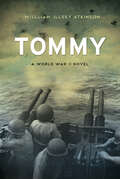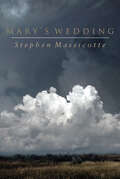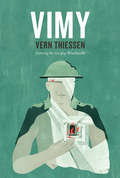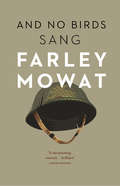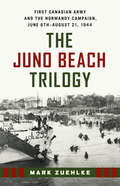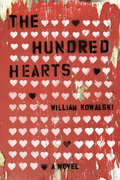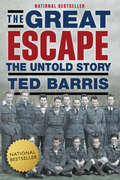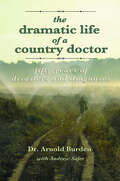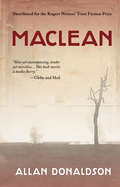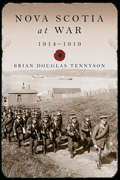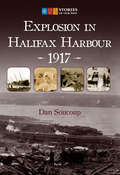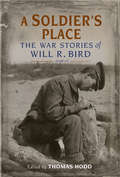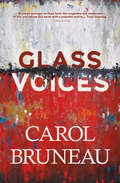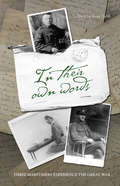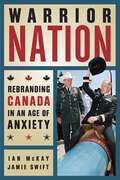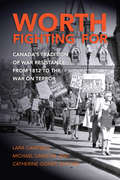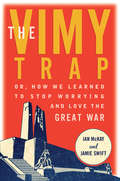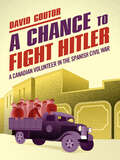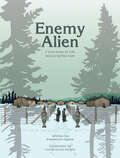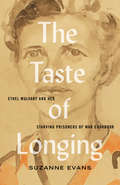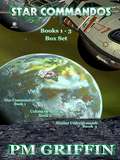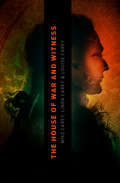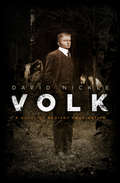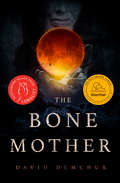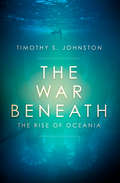- Table View
- List View
Tommy: A World War II Novel
by William Illsey AtkinsonA mathematician finds himself in the midst of the Pacific War in this “historical novel that can be appreciated by anyone, not just the history buffs” (Scene magazine). April 1945: In the aftermath of the battle for Okinawa, Tommy stands on the deck of the USS Bataan, the Independence-class aircraft carrier that he’s called home for a year. Once, he was a student in the classrooms of MIT. Now, thousands of miles away, he is surrounded by horrors—but uses his mathematical and navigational expertise to do his best to minimize the casualties. In this novel, William Illsey Atkinson tells the story of Japan’s Operation Ten-Go, and the fierce battle that sent dozens of vessels to their watery grave while hundreds of others were damaged from the air. Tommy spans the vast experience of one man’s life, from his hardscrabble childhood in early twentieth-century Dorris, California, to his heroic efforts in the South Pacific and beyond.
Mary's Wedding
by Stephen MassicotteOn the night before her wedding, Mary dreams of a thunderstorm, during which she unexpectedly meets Charlie sheltering in a barn beside his horse. With innocence and humour, the two discover a charming first love. But the year is 1914, and the world is collapsing into a brutal war. Together, they attempt to hide their love, galloping through the fields for a place and time where the tumultuous uncertainties of battle can’t find them. A play with a heart as big as the skies that serve as its stage, Mary’s Wedding is an epic, unforgettable story of love, hope, and survival.
Vimy
by Vern ThiessenFrance, 1917. Four wounded Canadian soldiers recover in a field hospital in the wake of the battle for Vimy Ridge, waiting to find out where they’ll be sent next: back home or back to the front. Along with a young nurse from Nova Scotia, they share their stories, reasons for fighting, and treasured memories. In Vimy, Governor General’s Literary Award–winner Vern Thiessen brings us a classic play that is not about war, but a reflection of the everyday lives of soldiers—their hopes and their dreams—and how actions can define individuals and nations. In the brand-new piece Bluebirds, Thiessen brings to light the stories of three Canadian nurses who crossed oceans to take care of others in the war. Bonding over their duties and patients, the nurses keep up a positive atmosphere, even as the front line draws closer to their field hospital.
And No Birds Sang
by Farley MowatTurned away from the Royal Canadian Air Force for his apparent youth and frailty, Farley Mowat joined the infantry in 1940. The young second lieutenant soon earned the trust of the soldiers under his command, and was known to bend army rules to secure a stout drink, or find warm - if non-regulation - clothing. But when Mowat and his regiment engaged with elite German forces in the mountains of Sicily, the optimism of their early days as soldiers was replaced by despair. With a naturalist's eyes and ears, Mowat takes in the full dark depths of war - and his moving account of military service, and the friends he left behind, is also a plea for peace. It is one of the most searing and unforgettable World War II memoirs from any Canadian.
The Juno Beach Trilogy
by Mark ZuehlkeTogether in one convenient ebook, three of Mark Zuehlke's epics of Canadian soldiers in World War II take us from the dramatic events of D-Day (June 6, 1944) to the days following, and the final push. Juno Beach, Holding Juno and Breakout from Juno focus on the Normandy Invasion and its aftermath.Juno Beach dramatically unfolds as 18,000 Canadian soldiers storm the five-mile-long stretch of Juno Beach. At battle's end one out of every six Canadians in the invasion force was either dead or wounded. The Canadians were the only Allied troop to meet their objectives.Holding Juno chronicles the crucial six days following the successful invasion. The ensuing battle was to prove bloodier than D-Day itself. The Canadians made it possible for the slow advance toward Germany and an Allied victory.Breakout from Juno takes us to the next battle a month later. On July 4, 1944, the 3rd Canadian Infantry Division won the village of Carpiquet but not the adjacent airfield. The 3rd Division, 2nd Infantry and 4th Armoured Divisions -- along with a Polish division and several British divisions came together as the First Canadian Army. This is their story.
The Hundred Hearts
by William Kowalski<p>2014 Thomas Raddall Atlantic Fiction Award — Winner <p>On April 7, 2005, an I.E.D. blast in Afghanistan alters the course of Jeremy Merkin’s life forever. <p>Still grieving the loss of his best friend, who was killed by the explosion, and nursing the physical and psychological wounds of the war, Jeremy returns home to find that nothing has changed, and yet everything is different. Living in the basement of a house he shares with his grandparents, mother, and mentally-challenged cousin, Henry, Jeremy smokes marijuana to combat his constant pain. He begins a career as a high school teacher, but memories of the war, the physical limitations caused by his injuries and a criminal accusation threaten to end his teaching career before it’s even begun. After Helen, the matriarch of the family, dies in her sleep, the already-dysfunctional Merkin clan comes unglued. Jeremy contacts his father, who lives in a local mental institution, to seek advice, only to discover that his grandfather has been hiding a dark secret from his family. His discovery of the secret alters the way he sees his family, and himself, forever. Amidst all this chaos, his cousin runs away from home to find his mother in New York City. Knowing Henry can’t possibly survive the trip on his own, Jeremy races across the country to find him. While in New York, Jeremy’s world is altered yet again, as more family secrets are uncovered, this time with dreadful consequences. The Hundred Hearts is a darkly funny story of the courage required to carry on after coming home, and the redemptive power of accepting and revealing our own secrets in order to move forward.</p>
The Great Escape: A Canadian Story
by Ted BarrisA unique retelling of WWII’s most dramatic escape, told through first-hand recollections of the soldiers who experienced it. On the night of March 24, 1944, 80 Commonwealth airmen crawled through a 336-foot-long tunnel and slipped into the forest beyond the wire of Stalag Luft III, a German POW compound near Sagan, Poland. The event became known as &8220;The Great Escape,&8220; an intricate breakout more than a year in the making, involving as many as 2,000 POWs working with extraordinary coordination, intelligence, and daring. Yet within a few days, all but three of the escapees were recaptured. Subsequently, 50 were murdered, cremated, and buried in a remote corner of the prison camp. But most don’t know the real story behind The Great Escape. Now, on the eve of its 70th anniversary, Ted Barris writes of the key players in the escape attempt, those who got away, those who didn’t, and their families at home. Barris marshals groundbreaking research into a compelling firsthand account. For the first time, The Great Escape retells one of the most astonishing episodes in WWII directly through the eyes of those who experienced it. Joint Winner of the Libris Award for Non-Fiction Book of the Year 2014Globe and Mail BestsellerToronto Star Bestseller
The Dramatic Life of a Country Doctor: Fifty Years of Disasters and Diagnoses
by Arnold Burden Andrew SaferA Canadian physician reflects on a lifetime of helping others, including during World War II and two deadly mining disasters.Dr. Arnold Burden&’s career began unintentionally when he performed his first surgery in the woods following a hunting accident at age fourteen. As a twenty-year-old hospital clerk, he handed battle casualties after D-Day in France and Germany. His early years as a doctor began in rural Prince Edward Island, where he served in the combined role of doctor and coroner. Back home in Springhill, Nova Scotia, Dr. Burden was the first medic to enter the mines after the deadly No. 4 mine explosion in 1956 and the No. 2 mine bump, the most severe bump ever recorded in North America, in 1958. In both cases he risked his life alongside the underground rescue teams to bring the gassed and trapped miners to the surface. In this new edition Dr. Burden gives his account of an active life and of a man dedicated to his patients; a man full of common-sense and interesting stories, who writes candidly of his dealing with patients, unusual cases, and brave efforts made under difficult conditions. As the author states: &“The real satisfaction in life has come from helping people.&”
Maclean
by Allan DonaldsonIn this novel set over the course of a day, an alcoholic, Canadian, World War I veteran attempts to find peace while shopping for a birthday present.Twenty-five years after the Great War, John Maclean is still struggling to carve out a meaningful existence in his small New Brunswick hometown.One late summer day he embarks on a seemingly prosaic search for a little money, a little booze, and a birthday gift for his mother. But he’s haunted by memories—of war, of his cruel father, of opportunities wasted and lost—and each moment is shadowed by his bleak history. Shell-shocked and alcoholic, Maclean is divided between a lonely present and a violent past.With clean and evocative prose, author Allan Donaldson exquisitely depicts a shattered war veteran’s search for peace. Praise for Maclean“Slim yet encompassing, tender yet merciless . . . This book merits a media flurry.” —Globe and Mail (Canada)
Nova Scotia at War, 1914–1919
by Brian Douglas TennysonAn in-depth historical study of Nova Scotia&’s role in WWI and its lingering impact on the region, its people, and its economy. Though the First World War ended in 1918, it continued to haunt Canada for generations. In Nova Scotia at War, 1915-1919, historian Brian Douglas Tennyson examines what was, for the people of Canada, an unprecedented period collective military trauma. As Tennyson demonstrates, the war effort didn&’t end with the brave soldiers and sailors who went overseas. It also touched the lives of civilians who worked in the fishery, on the farms, and in the forests, coals mines, and steel mills. A specialist in early twentieth-century Canadian political history, Tennyson examines the economic impact of the war with incisive clarity. In an often overlooked cost of the conflict, it shattered Nova Scotia's dream of becoming the Atlantic gateway and the industrial heartland of Canada. This volume includes 30 black and white photos.
Explosion in Halifax Harbour, 1917 (Stories of Our Past)
by Dan SoucoupA riveting account of the collision of two ships—and the worst human-caused explosion in history before Hiroshima—with dozens of photos and illustrations. In late 1917, one of the greatest natural harbors in the world was humming with excitement. Halifax Harbor was filled with naval convoys and merchant vessels while factories worked overtime in support of the Allied war effort in Europe. But on December 6, Canada&’s worst disaster struck, as two ships—one carrying high explosives—collided. The resulting blast killed and injured thousands, razing the city&’s North End and destroying nearly everything in its path. This history is an account of tremendous human suffering and devastation, yet also of human bravery and survival against all odds. Chaos and confusion reigned that day in Halifax and Dartmouth, Nova Scotia, but what followed was a massive relief effort involving charitable assistance from all over the globe—especially Massachusetts. Explosion in Halifax Harbour, 1917 includes a detailed account of the event, chronicling many remarkable human tragedies, rescue and relief efforts, attempts to place blame for the collision, and the reconstruction program that created Canada&’s first government-assisted housing program. Also included are 60 full-color images as well as sidebars on many monuments and commemorations that pay tribute to this catastrophic event. &“Begins with a history of Halifax and its harbor and how important it was for the war effort in Europe…while there were countless acts of heroism, Soucoup writes there were also acts of looting and profiteering.&” —The Star
A Soldier's Place: The War Stories of Will R. Bird
by Will R. BirdA collection of World War I short fiction by the author of the memoir And We Go On. Nova Scotia–born Will R. Bird miraculously survived the First World War and returned to Nova Scotia. Determined to tell the stories of the brave soldiers who served, Bird became one of the most prolific authors on the subject, completing works of both fiction and nonfiction. For nearly two decades following the war, Bird published war stories in magazines and periodicals, which have now gone out of print and were never digitized, and the stories had long fallen into obscurity—until now. Carefully curated by author and editor Thomas Hodd, A Soldier&’s Place is a selection of fifteen of Bird&’s best combat stories, based on the experiences of himself and of others, covering all aspects of the war effort and following brave Canadian, American, and Australian soldiers.
Glass Voices: 10th Anniversary Edition
by Carol BruneauSurviving the 1917 Halifax Explosion leaves a grieving Nova Scotia couple on a long and difficult road to redemption in this &“textured and rich&” novel (Quill & Quire). Though they survived the Halifax Explosion of 1917, Lucy Caines and her wayward husband, Harry, lost everything in the day&’s terrible events—including their infant daughter. Determined to make peace with their grief and salvage what&’s left of their lives, they begin to rebuild on the rustic shores of Halifax&’s Northwest Arm. But coping isn&’t easy, and each descends into isolation and denial: Lucy through guilt and reticence, and Harry through drinking and gambling. Despite the birth of a treasured son, the couple faces a future clouded by fear and apprehension. Then, fifty-two years after the catastrophe, yet another calamity strikes. Now Lucy must confront the miracle of their survival, reexamine the past, and struggle to become the author of her own happiness.
In Their Own Words: Three Maritimers Experience the Great War
by Ross HebbA historian examines the letters written by three residents of Canada&’s Maritime provinces during their service in World War I. What was the First World War really like for Maritimers overseas? This epistolary book, edited by historian Ross Hebb, contains the letters home of three Maritimers with distinct wartime experiences: a front-line soldier from Nova Scotia, a nurse from New Brunswick, and a conscripted fisherman from Prince Edward Island. Up until now, these complete sets of handwritten letters have remained with the families who agreed to share them in time for the one-hundredth anniversary of the Great War&’s end in 2018. These letters not only give insight into the war, but also provide greater understanding of life in rural Maritime communities in the early 1900s. In Their Own Words includes a learned introduction and background information on letter writers Eugene A. Poole, Sister Pauline Balloch, and Harry Heckbert, enabling readers to appreciate the context of these letters and their importance. A welcome companion to Hebb&’s earlier book, Letters Home: Maritimers and the Great War; 1914–1918.
Warrior Nation: Rebranding Canada in an Age of Anxiety
by Ian McKay Jamie SwiftOnce known for peacekeeping, Canada is becoming a militarized nation whose apostles—-the New Warriors-—are fighting to shift public opinion. New Warrior zealots seek to transform postwar Canada’s central myth-symbols. Peaceable kingdom. Just society. Multicultural tolerance. Reasoned public debate. Their replacements? A warrior nation. Authoritarian leadership. Permanent political polarization. The tales cast a vivid light on a story that is crucial to Canada’s future; yet they are also compelling history. Swashbuckling marauder William Stairs, the Royal Military College graduate who helped make the Congo safe for European pillage. Vimy Ridge veteran and Second World War general Tommy Burns, leader of the UN’s first big peacekeeping operation, a soldier who would come to call imperialism the monster of the age. Governor General John Buchan, a concentration camp developer and race theorist who is exalted in the Harper government’s new Citizenship Guide. And that uniquely Canadian paradox, Lester Pearson. Warrior Nation is an essential read for those concerned by the relentless effort to conscript Canadian history.
Worth Fighting For: Canada’s Tradition of War Resistance from 1812 to the War on Terror
by Lara Campbell, Michael Dawson, and Catherine GidneyHistorians, veterans, museums, and public education campaigns have all documented and commemorated the experience of Canadians in times of war. But Canada also has a long, rich, and important historical tradition of resistance to both war and militarization. This collection brings together the work of sixteen scholars on the history of war resistance. Together they explore resistance to specific wars (including the South African War, the First and Second World Wars, and Vietnam), the ideology and nature of resistance (national, ethical, political, spiritual), and organized activism against militarization (such as cadet training, the Cold War, and nuclear arms). As the federal government continues to support the commemoration and celebration of Canada’s participation in past wars, this collection offers a timely response that explores the complexity of Canada’s position in times of war and the role of social movements in challenging the militarization of Canadian society.
The Vimy Trap: or, How We Learned To Stop Worrying and Love the Great War
by Ian McKay Jamie SwiftThe story of the bloody 1917 Battle of Vimy Ridge is, according to many of today’s tellings, a heroic founding moment for Canada. This noble, birth-of-a-nation narrative is regularly applied to the Great War in general. Yet this mythical tale is rather new. “Vimyism”— today’s official story of glorious, martial patriotism—contrasts sharply with the complex ways in which veterans, artists, clerics, and even politicians who had supported the war interpreted its meaning over the decades. Was the Great War a futile imperial debacle? A proud, nation-building milestone? Contending Great War memories have helped to shape how later wars were imagined. The Vimy Trap provides a powerful probe of commemoration cultures. This subtle, fast-paced work of public history—combining scholarly insight with sharp-eyed journalism, and based on primary sources and school textbooks, battlefield visits and war art—explains both how and why peace and war remain contested terrain in ever-changing landscapes of Canadian memory.
A Chance to Fight Hitler: A Canadian Volunteer in the Spanish Civil War
by David GoutorIn late 1936, as Franco’s armies stormed toward Madrid, Stalin famously termed the defence of Spain “the common cause of all advanced and progressive mankind.” As a German emigrant to Winnipeg, Hans Ibing recognized the importance of the Spanish Civil War to the struggle against worldwide fascism in a way that most people in Canada did not—joining the International Brigades in their fight to defend the Spanish Republic was his “chance to fight Hitler.” Drawing on interviews, Ibing’s personal papers, and archival material, David Goutor recounts the powerful story of an ordinary man’s response to extraordinary times.
Enemy Alien: A True Story of Life Behind Barbed Wire
by Kassandra LuciukThis graphic history tells the story of Canada’s first national internment operations through the eyes of John Boychuk, an internee held in Kapuskasing from 1914 to 1917. The story is based on Boychuk’s actual memoir, which is the only comprehensive internee testimony in existence. The novel follows Boychuk from his arrest in Toronto to Kapuskasing, where he spends just over three years. It details the everyday struggle of the internees in the camp, including forced labour and exploitation, abuse from guards, malnutrition, and homesickness. It also documents moments of internee agency and resistance, such as work slowdowns and stoppages, hunger strikes, escape attempts, and riots. Little is known about the lives of the incarcerated once the paper trail stops, but Enemy Alien subsequently traces Boychuk’s parole, his search for work, his attempts to organize a union, and his ultimate settlement in Winnipeg. Boychuk’s reflections emphasize the much broader context in which internment takes place. This was not an isolated incident, but rather part and parcel of Canadian nation building and the directives of Canada’s settler colonial project.
The Taste of Longing: Ethel Mulvany and Her Starving Prisoners of War Cookbook
by Suzanne EvansHalf a world away from her home in Manitoulin Island, Ethel Mulvany is starving in Singapore’s infamous Changi Prison, along with hundreds of other women jailed there as POWs during the Second World War. They beat back pangs of hunger by playing decadent games of make-believe and writing down recipes filled with cream, raisins, chocolate, butter, cinnamon, ripe fruit – the unattainable ingredients of peacetime, of home, of memory. In this novelistic, immersive biography, Suzanne Evans presents a truly individual account of WWII through the eyes of Ethel – mercurial, enterprising, combative, stubborn, and wholly herself. The Taste of Longing follows Ethel through the fall of Singapore in 1942, the years of her internment, and beyond. As a prisoner, she devours dog biscuits and book spines, befriends spiders and smugglers, and endures torture and solitary confinement. As a free woman back in Canada, she fights to build a life for herself in the midst of trauma and burgeoning mental illness. Woven with vintage recipes and transcribed tape recordings, the story of Ethel and her fantastical POW Cookbook is a testament to the often-overlooked strength of women in wartime. It’s a story of the unbreakable power of imagination, generosity, and pure heart.
Star Commandos: Books 1 - 3 Bundle
by Griffin PmBest-selling author, PM Griffin, bundles books 1 to 3 from her Star Commandos Series, 746 pages of riveting space opera adventure: Star Commandos: Book 1 Raw courage and will to fight must prevail over an uncountable horde's all-encompassing drive to consume, or humanity on Vishnu must submit to certain, viciously cruel death. Colony in Peril: Book 2 Betrayal of trust brings danger in space and near-certain massacre on-world should the Commandos fail to conquer almost insurmountable odds. Mission Underground: Book 3 A perilous underground world and deadly human foes bar the Commandos from the weapon of mass destruction they must seize.
The House of War and Witness
by Mike Carey Linda Carey Louise Carey“A fantastical ghost story and a suspenseful military mystery . . . A daringly original fantasy novel” from the authors of The Steel Seraglio (Publishers Weekly). 1740. With the whole of Europe balanced on the brink of war, an Austrian regiment is sent to the furthest frontier of the empire to hold the border against the might of Prussia. Their garrison, the ancient house called Pokoj. But Pokoj is already inhabited by a company of ghosts from every age of the house’s history. Only Drozde, the quartermaster’s mistress, can see them, and terrifyingly they welcome her as a friend. As these ageless phantoms tell their stories, Drozde gets chilling glimpses not just of Pokoj’s past but of a looming menace in its future. Meanwhile the humorless lieutenant Klaes pursues another mystery. Why are the people of the neighboring village so surly and withdrawn, so reluctant to welcome the soldiers who are there to protect them? What are they hiding? And what happened to the local militia unit that was stationed at Pokoj before the regiment arrived? The camp follower and the officer make their separate journeys to the same appalling discovery—an impending catastrophe that will sweep away villagers and soldiers alike. Perhaps neither of them can prevail. If they do, it will be with the help of the restless dead . . . “TheHouse of War and Witness burns slow to start, but by the end it burns fiercely. It’s a compelling, accomplished novel, deft with its characters and interesting with its themes.” —Strange Horizons
Volk: A Novel of Radiant Abomination
by David NickleThe Bram Stoker Award–winning author “triumphantly returns to the world of Eutopia” in this “dazzling horror novel”of Nazis and demonic forces (Publishers Weekly, starred review). At the dawn of the twentieth century, orphaned farm boy Jason Thistledown and black physician Andrew Waggoner came face to face with monsters both human and inhuman. Alongside American eugenicists seeking to perfect the human race through breeding and culls, there was a parasitic entity named Juke that lived off people’s hopes, dreams, and faith, as it consumed humanity from within. Now the year is 1931, and the past that haunts Andrew and Jason is about to bring them together again. Andrew, now living in Paris, continues his tireless work to destroy the elusive Juke. Jason, a veteran pilot of WWI, is embarking on a new career flying mail across North Africa, hoping to forget his encounter with it. But in a remote valley in the Bavarian Alps, Germanic students of those same American eugenicists are desperately trying to uncover the secret of the Juke . . . and the promise of the Übermensch.
The Bone Mother
by David DemchukFinalist for the Shirley Jackson Award: “Beautiful and brutal nightmares . . . made all the more terrifying by the history in which they’re grounded.” —Publishers Weekly, starred review Three neighboring villages on the Ukrainian/Romanian border are the final refuge for the last of the mythical creatures of Eastern Europe. Now, on the eve of the war that may eradicate their kind—and with the ruthless Night Police descending upon their sanctuary—they tell their stories and confront their destinies. The Rusalka, the beautiful, vengeful water spirit who lives in lakes and ponds and lures men and children to their deaths. The Vovkulaka, who changes from her human form into that of a wolf and hides with her kind deep in the densest forests. The Strigoi, a revenant who feasts on blood and twists the minds of those who love, serve, and shelter him. The Drevniye, an apparition that impersonates its victim and draws him into a web of evil in order to free itself. And the Bone Mother, a skeletal crone with iron teeth who lurks in her house in the heart of the woods, and cooks and eats those who fail her vexing challenges. Eerie and unsettling like the best fairy tales, these incisor-sharp portraits of ghosts, witches, sirens, and seers—and the mortals who live at their side and in their thrall—will chill your marrow and tear at your heart. “A fable filled with mythical creatures ranging from werewolves to witches . . . set, in part, among the villages of eastern Europe on the eve of the Second World War.” —The Globe and Mail (Toronto) “Extraordinary . . . A dark and shining mosaic of a story with unforgettable imagery and elegant, evocative prose.” —Publishers Weekly, starred review Longlisted for the 2017 Scotiabank Giller PrizeWinner of the 2018 Sunburst AwardLonglisted for the 2018 Toronto Book Awards
The War Beneath (The Rise of Oceania #1)
by Timothy S. JohnstonA Global Thriller Award–winning novel: “Fast-paced, good old-fashioned Cold War espionage set underwater in 2099, this book offers a great escape!” (The Minerva Reader). Living underwater is inherently dangerous. At any moment, a trickle of water from the bulkheads could mean immanent death. But Truman “Mac” McClusky is used to danger. He’s been out of the intelligence business for years, working the kelp farms and helping his city Trieste flourish on the shallow continental shelf just off the coast of Florida. Then his former partner shows up, steals a piece of valuable new technology and makes a mad dash into the Atlantic. Before he knows it, Mac is back in the game, chasing the spy to retrieve the tech—and teach his former friend a lesson he won’t forget. But when Mac learns the grim truth behind the theft, it plunges him into an even deadlier mission. With lethal secrets in his pocket, he needs to evade the submarines of hostile foreign powers, escape assassins, and forge through the world’s oceans at breakneck pace on a daring quest to save his city and stay alive.
